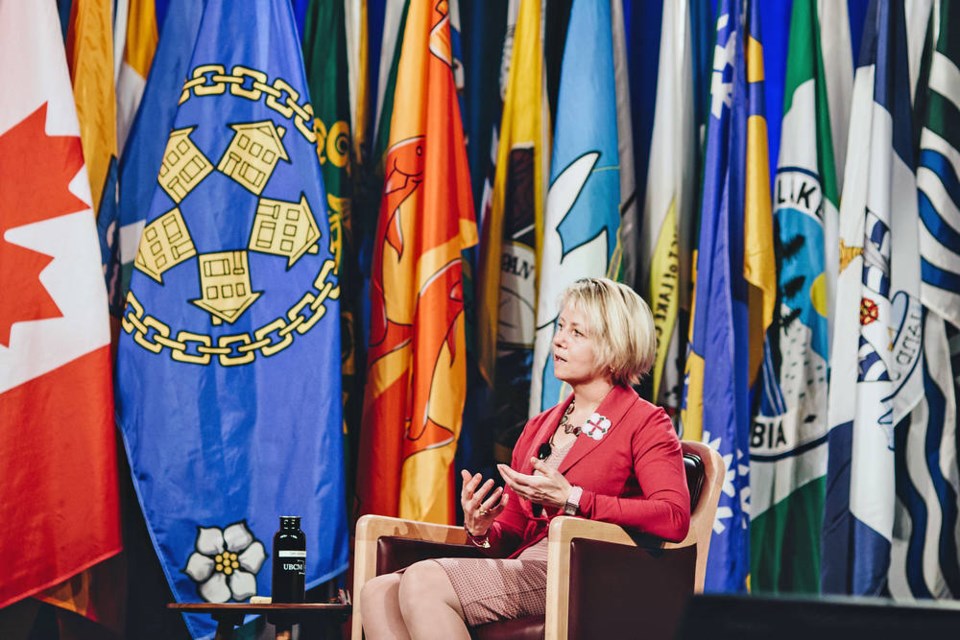Provincial health officer Dr. Bonnie Henry divulged a few details Tuesday about the downside of rocketing to household-name status as the face of B.C.’s pandemic response.
Those details were appalling.
She said it’s “been very positive in many ways, but also very negative.” All politicians and high-profile people become targets, she recognized. But “I believe it’s targeted in ways that at least I am unable to understand. …
“There are many people who don’t like what I do, or don’t like the way I see it, or don’t like my shoes. … People feel quite able to send me nasty notes, to leave phone calls to harass my office staff. I’ve had to have security in my house, I’ve had death threats.”
She was appearing on a panel about “reimagining leadership in the pandemic” with two other prominent women — Lt.-Gov. Janet Austin and former Tsawwassen First Nation chief Kim Baird. They were at an online Union of B.C. Municipalities convention.
“How do we deal with that?” Henry asked generally. In the context of an all-women panel, the “we” referred to women, because a lot of that kind of garbage behaviour is gender-based.
“I think people find it’s okay to do that for a woman who’s up front, more so than some of our male leaders, but I could be wrong,” Henry said.
The other panelists indicated over the course of 90 minutes that she’s not wrong. And from my casual chats with women leaders over the years, I think if they all lined up and disclosed the vitriolic personal abuse they get from total strangers, it would leave people revolted.
I bet that every single female politician who happens to read Henry’s revelation is nodding her head in recognition.
Her job comes with major legal authority and she compounded that with a particular command presence that made her the most powerful public figure in B.C. this year. People are perfectly entitled to scrutinize that power, and question how she makes her judgment calls on closings, limits, masks and curtailments. Particularly when her calls impose such big costs on people.
But when that turns into personally abusive, demeaning and even criminal behaviour, it’s so far out of bounds there are scarcely words to condemn it.
The only redeeming point is the certain knowledge that the vast majority of people reading this are disgusted by that disturbed minority.
No less a leader than the lieutenant-governor herself backed Henry on whether women have to put up with more.
Austin said: “I do think you’re correct, that female leaders experience a different level of scrutiny than male leaders. …The idea of female leadership is unfamiliar still to some people; that is changing.”
On abuse generally, she said: “This whole culture of incivility is something as a society I don’t think we can tolerate.”
Henry later discussed how to deal with the incivility. It’s exactly in accord with her pandemic messaging of kindness and empathy.
“Being calm, taking a step back, recognizing that when a person is angry … often it’s because of fear. It’s because they’re not knowing what’s going to happen, and that their anger is a reflection of that.”
The discussion took place months after people started taking notice of the number of women public health leaders in B.C., Alberta and nationally who have come to prominence.
They were talking just a week after an international study that suggested countries led by women — New Zealand, Germany, Finland, Taiwan — are dealing with COVID-19 much better. (What a way to start a gender argument.)
All the panelists agreed that small acts of kindness help wash away the upset over unwarranted abuse.
Baird referred to hearing extremely racist remarks at a public meeting that went unchallenged but said encouragement kept her going.
Henry said when things were “really hairy” last spring, she got a handwritten note of support from Austin that meant a lot.
The takeaway seems to be you can kill the ignorant hostility with kindness — once you get over how repugnant it is.
lleyne@timescolonist.com



